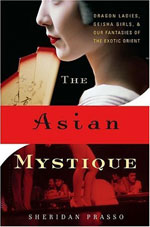

|

KWR Book Reviews Sheridan Prasso, The Asian Mystique: Dragon Ladies, Geisha Girls and Our Fantasies of the Exotic Orient (New York: Public Affairs Press, 2005). 437 pages. $27.95. Reviewed by Scott B. MacDonald
With a wide range of interviews from prostitutes and bar girls to mayors and presidents throughout Asia, Sheridan Prasso's The Asian Mystique is an interesting and highly readable book of how the West looks upon the East. What is the Asian mystique? According to Prasso, it is “…the fantasy of the exotic, indulging, decadent, sensual Oriental who will indulge you and delight you with the decadence and servility that no woman in your culture could. It is built upon thousands of years of East-West interaction, and loaded with images, expectations, and misperceptions.” To further clarify, the Asian mystique boils down to looking upon Asia as an exotic, conquerable mistress, an image that more clearly emerged with the Victorians and was later reinforced and mass-marketed by Hollywood. Along these lines, the West created the Asian mystique, a perception that is primarily sexual and centered around simplification of Asian men (effeminate), women (alluring yet easy/or dangerous dragon ladies) and nations (just waiting for Western domination). She also admits that many Asians continue to push this image along with everything from Singapore Airlines to mail order brides. Prasso has written a notable book. It is always useful to cast light on stereotypes and certainly the West has them vis-à-vis Asia. In a world that is rapidly shrinking due to the globalization of communications, the ability to maintain misconceptions is dangerous. Prasso argues that it is time to move beyond stereotypes and focus on what builds a more open-minded global community. Some of what she writes is commonsensical, but much of it is nuanced. As with all notable books, The Asian Mystique is stirring up debate, though of the response has been largely positive. As one Asian woman on Amazon.com commented of Prasso's book: "The author's book, which attempts to unravel the Asian woman psyche, is an important tribute to the often misjudged and underestimated Asian women. It is a work of art and labor as well as a literary achievement. In time I'm sure it will turn out to be a bestseller." Prasso clearly has a point about the Asian mystique mindset. Beyond the myriad of Internet sites dedicated to Asian sex and tips of where to go for a good time in Bangkok as well as the entire universe of mail order brides, there is also a literature that is clearly marketing to keep the Asian mystique alive and well and some of it being written by Asians. Take Tania Wang’s Dating Asians or Ming Tan’s How to Attract Asian Women. Wang offers how to become “Asian-savvy”. Tan states: “Depending on how long they have lived outside of Asia, some Asian women are definitely different from other women you might date…” Maybe the same could be said about European, Latin American and African women. Prasso is not alone in observing the Asian mystique as it builds up the differences and downplays any of the commonalities between people. One response to Wang’s Dating Asians sums it up nicely: “Being Asian myself I am highly insulted by this book. To think there is some mystical book that tells people how they date Asians is totally foolish. Guys, Asians are girls like other girls and they like the same things.” The Asia Mystique clearly understands that view and provides considerable ammunition the Wang-approach to Asia is certainly damaging for all parties involved. Prasso has pointed the way to what is a very fertile area of discussion - the mix of culture and sex, attraction and misperception, and myth and reality. The Asian Mystique is thought provoking and well worth reading. Tim Clark and Carl Kay, Saying Yes To Japan: How Outsiders Are Reviving A Trillion Dollar Services Market (New York: Vertical, 2005). 175 pages. $14.95. Reviewed by Scott B. MacDonald
Tim Clark and Carl Kay have written an excellent book for anyone interested in the history of Japan’s service industry and how someone with an entrepreneurial bent can take advantage of the gap between a culture dedicated to the “relentless pursuit of perfection” and the often poor service given to the consumer in those sectors crucial to having a high quality of life. This is a very worthwhile book to read, especially as Japan has re-emerged on investor’s radar screens and the country offers considerable opportunity. Japan has much to offer the adventurous entrepreneur – be he or she a foreigner or Japanese. Clark and Kay point out that although China is usually in the spotlight for investors, it is foolish to pass up Japan. The Asia Pacific country is the world’s second largest economy behind the United States, has one of the highest levels of per capita income, and has a developed consumer culture. As Clark and Kay note: “Corporations and individuals have sold more than two trillion dollars worth of services each year since 2000, with services forming an ever-growing portion of gross domestic product.” Other attractions of investing in Japan’s service sector (over many Emerging Markets) include sociopolitical stability, an easy-to-reach, affluent and highly educated population, an ultra-reliable transportation and utility infrastructure, and a political economy offering substantial freedom and unrestricted ability to repatriate hard currency earnings. Those sectors that constitute the “invisible” economy, i.e., Japan’s large domestic economy, are health care, retailing, construction, agriculture, real estate, finance, information technology services, transportation and logistics. These are the most open to the gap mentioned earlier and the need for better service. An additional push for better service industries is demographic – Japan’s population is aging and many of those grey-haired to be consumers are going to want better health care, finance and transportation. Saying yes to Japan is a solid book, written by two men that have certainly anchored their lives in Japan – they have lived in the country for long periods of time, married Japanese women, had children grow up in the country, and run businesses there. They provide a valuable addition to a subject that has long been ignored.
|

